While the temperature is decent outside, I sleep way too hot under the metallic roof. I wake up many times in my own sweat puddle, like if I were an ice cube melting. Those roofs are certainly cheaper, easier to build and to repair than a traditional thatched roof of good quality, but horribly hot under.
Leaving the cheerful and helpful Domingo back to his work, I start my crossing of the country from west to east. The main road connecting Bissau passes through the main cities, Bafatá and Gabú. I spot a fair number of Mauritanians, managing small but successful boutiques in the villages. They are basically the only Whites I see here. Guinea-Bissau has a population of 1,6 M inhabitants, of which 25% live in the capital. The second largest city, Bafatá, barely gathers more than 20’000, and 15’000 estimated for the third one, Gabú. Those two are my next stops.
The mangoes in Guinea-Bissau have a different color. Instead of turning from green to orange and from orange to yellow, they turn from green to purple and from purple to red. Just ripe, they are as delicious as their sisters from Casamance. At one point on the road, I lose my left glove that I removed to eat some and can’t find it again. It has probably been taken by one of those kids running in the bushes in underwear and sandals.
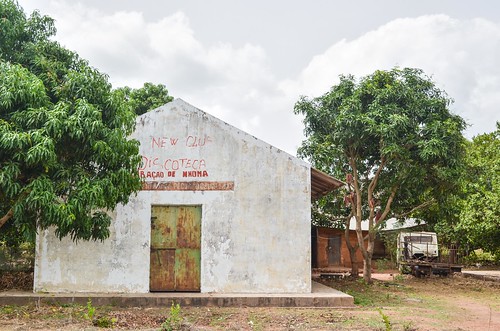
I notice also many Bissau-Guineans speak some French. I was told a lot of people move for work between Guinea and Guinea-Bissau, and this probably helps this small state of the size of Switzerland, surrounded by French-speaking countries, to be more connected. It already shares the CFA Franc currency. Also in general, the ECOWAS area being visa-free for the citizens, there is a lot of migration in between West African countries. I discovered that the 6 countries of the ECOWAS who do not use the CFA Franc plan to move to another common currency. Although it is planned for 2015, I have never heard of it other than on the internet.

I find the locals less smiling than their neighbors, but they would always be helpful. All of them are not asking for money (dinheiro). Usually, the ones asking in the countryside are the kids, like if it was a game to get something from the White people. Women, no matter how old, beg sometimes like kids, much more straightforward and minus the smile. I remember having seen at some point a sign reading “Educate a women, educate the nation”. Kids grow around the mother, and little girls partake in the household tasks (dishes, laundry) as soon as they can. The only adult men begging are the disabled and the blind, and they don’t make a special fuss when they see a White man.

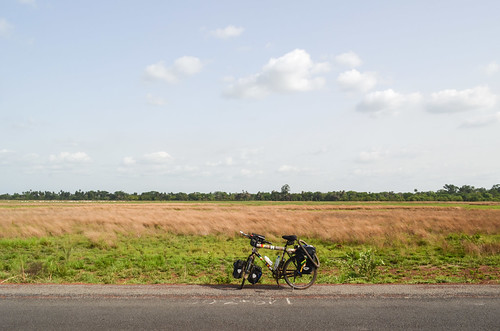
The long, straight and empty road I follow takes me through a jungle, with a cultivated plot from times to times, when the trees leave the space up for it. The cars and trucks drive fast, they overtake me after honking for a while and leaving only little space between us even if the other lane is empty.
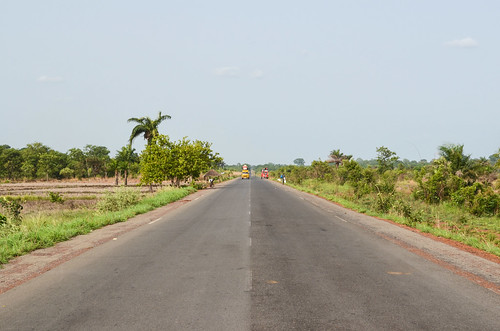
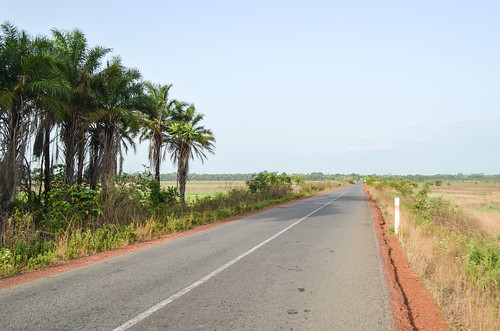
The houses are always the same: a big single building covered by a corrugated iron roof. Electricity is not an option. I don’t make it to Bafata today but I reach a small village, Bandanjan, at a crossroads. The only light comes from the petrol station. As I don’t want to take one of the pricey rare rental accommodation options, the young policeman offers to let me sleep at his room.
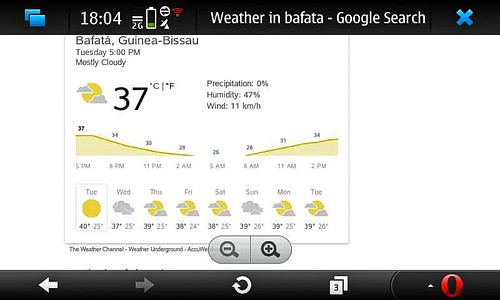
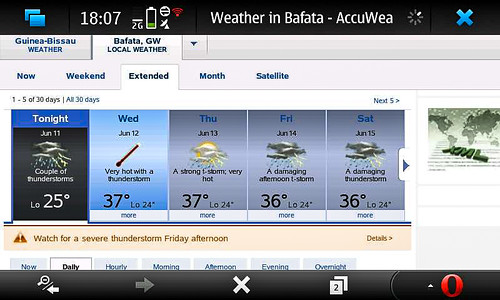
I decline the invitation, as I would sleep much better anywhere else than sweating under a metallic roof, and put my mosquito net in the entrance. I am given a bucket of water to shower, in the gutter right in front of the house. The night is good for hiding as one is always seen somehow while showering. This does not prevent my host to introduce his sisters to me just when I am undressing. But the night is not good as for seeing where I am showering, and it is generally close to filthy areas where water and feces stagnate. Yesterday while showering, I felt things climbing up my toes and feet. I understood only later, with the morning daylight, that I was standing on a carpet of maggots. I was glad I took the habit of never showering barefoot, but with flip-flops, anywhere.
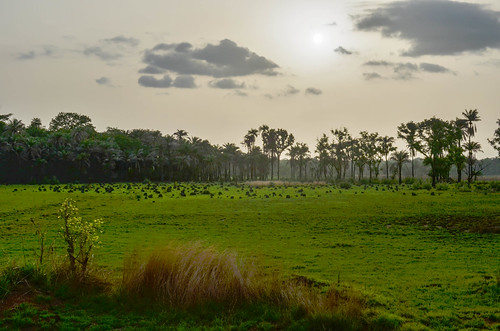
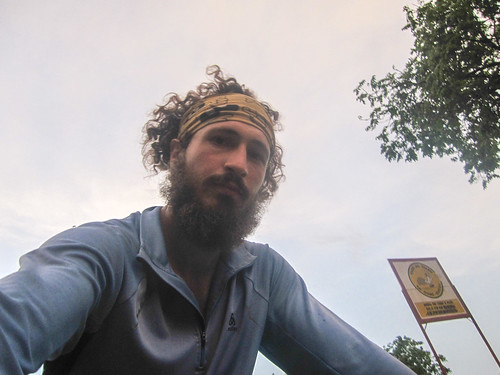
I sleep well outside, much better than inside, and must leave Idrissa’s house very early, just like his working day with the police.
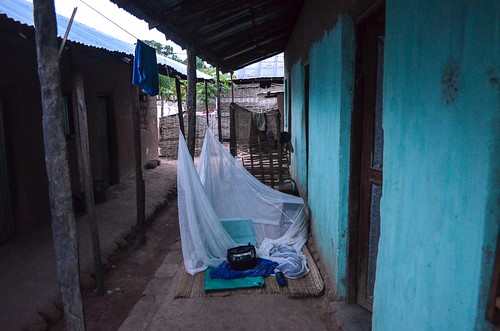
I cycle a few kilometers out of Bandandjan with the light of the sun about to rise. It is beautiful and it is also time for a road-side coffee and oily fried doughnuts.
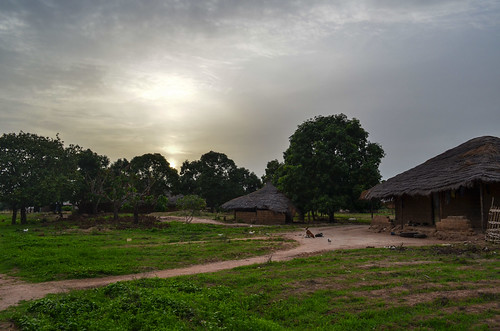
When the payment comes, there are no more coins in my coins pocket, no more bills in my bills pocket. It is strange, as breaking down a 10’000 CFA bill is not always easy and I always know what kind of bills I carry with me. I really wake up when I realize my bill pouch has been emptied.
When I slept under the mosquito net outside, my stuff was in the room of Idrissa and locked at all times. Angry that the robbery has happened inside the room of the policeman, to whom I gave something while he walked me until the exit of his town, I cycle back the 3 km to Bandandjan to get an explanation. I realize I have few chances to win anything by accusing the police to have stolen me, and I could live with the 15 € loss, but I am already cycling back.
This is the first time of the trip I am stolen. I usually feel very safe in the villages, as people are usually nicer and more honest than in the cities. And when I am the only branco, rapidly seen by everyone, my gear and I are objects of attention and it is highly unlikely someone would try anything on those two.
When I find the young policeman and his father, the police chief, they seem as shocked as me and hurry to return my cash back, from the very same room inside which my stuff was stored. They apologize and rush me to leave again. I roughly check that nothing important is missing from my panniers and leave very confused, twice shocked, to have been stolen by the police and to have been returned my cash so easily.
By the time I try to figure out what really happened and re-analyzing the facts, I reach Bafata, the second largest city of Guinea-Bissau. I stop for a cold drink at a Mauritanian shop, where things are rather expensive. Electricity is privately generated and distributed, hence expensive. No one in town knows what is a post office and where it is. Some people point a direction to me, but when I seem to get close, I only meet ignorance.

I can understand that people don’t know what a postcard is. It is asking for something purely touristic in a country where tourism is nonexistent. But not knowing what is a post office, and what is the post? If I try to explain it, I am replied at best “oh, you mean an email?“.

When I abandon my search of the post office and head to the old colonial center of Bafata, I finally find it by chance. The office is partly occupied by another association and I have to wait for the post manager to come back.
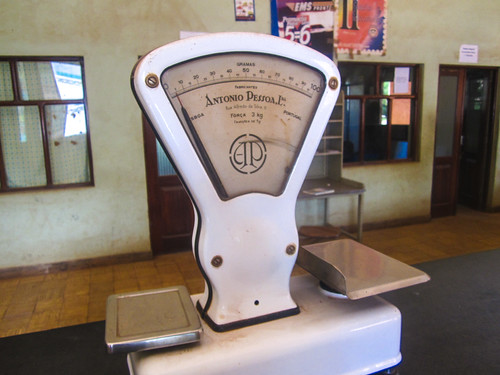
The manager is back one hour later. He teaches me that “You know, … the country is not going well, …” … basically that there is no service. It seems there is really nothing running in this country. This post office is like a vestige of a former civilization. We can put alongside the electricity, that used to be there if I refer to the broken electric poles along the road, the running water, since houses have bathrooms and toilets, with pipes, but work only with an external bucket of water, and probably telephone landlines as well.
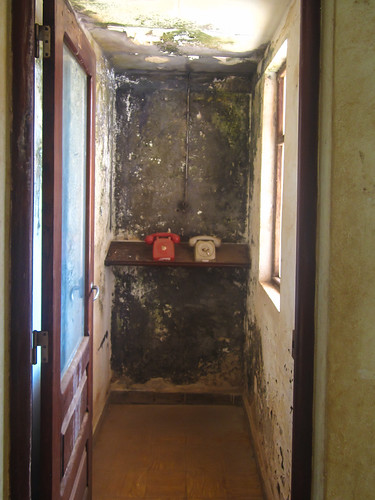
If the people are not even aware of what a government is supposed to do for its country, no wonder that there is no interest in politics, no hope for the country, sometimes not even the understanding of why one should vote for someone. It is every man for himself anyway.
The old trading post is located by the river and it must have been a very nice place before. It is left abandoned now.
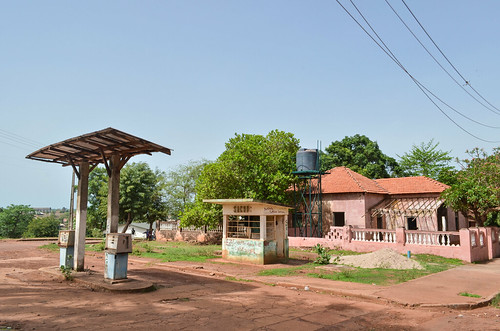
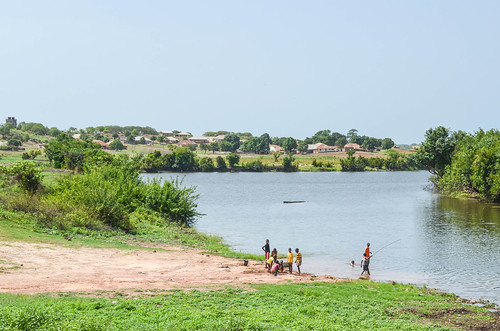
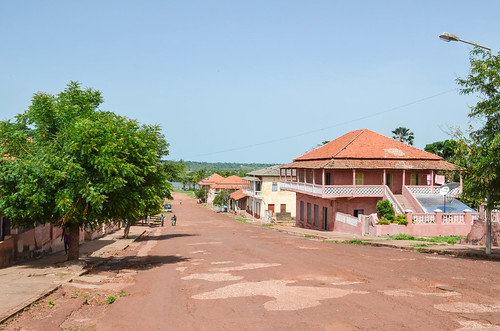
In Bafata, and in the whole country in general, it is hard to find those restaurant stalls by the road selling food any time of the day. There are more shops equipped with a solar panel offering a “cellphone charge” for 100 or 150 CFA than small kitchens. I am left with eating 3 small baguettes (the bread has always been very good since I left Spain) with canned sardines.
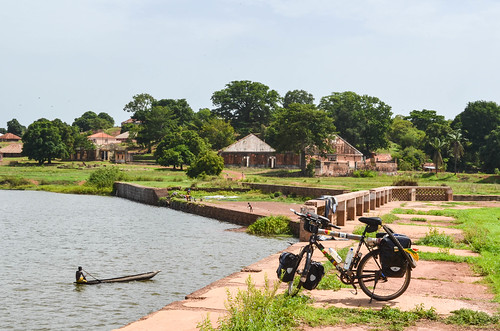
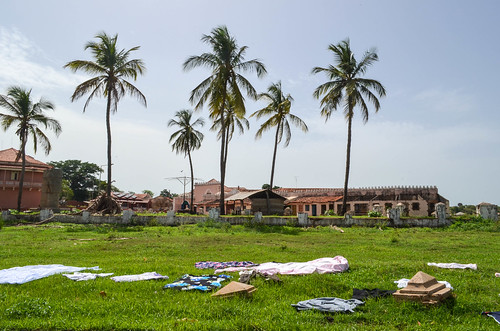
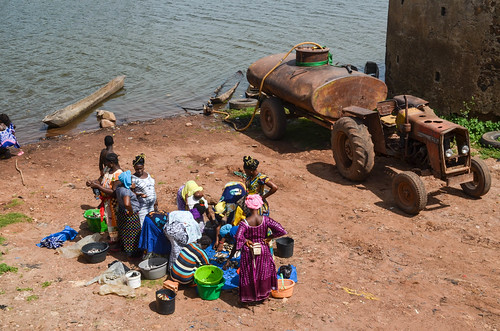
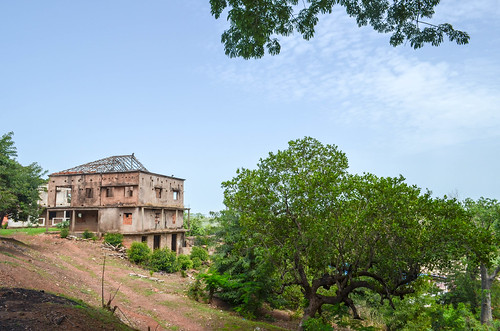

After two nights of short and bad sleep, the sudden big intake of food does not forgive. I can’t help but taking a nap in a village.
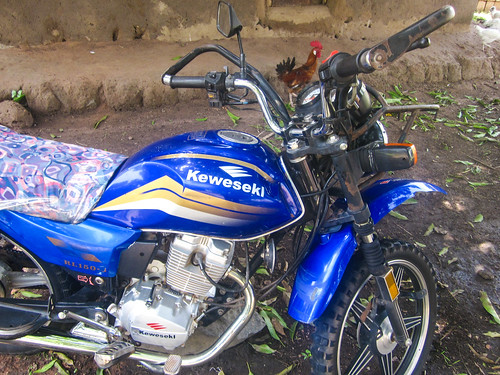
I wake up to complete the straight road to Gabu, the third town of Guinea-Bissau, fifty kilometers further. There is no reason to stop in between, the landscape is beautiful yet monotonous, and there are no attractions on the way. And unlike Bafata, Gabu has no historical building to offer, but plenty of shops. The city center itself is a market organized along the same road leading to Guinea. It must have been a long time the asphalt disappeared and the big holes are slowing down the cars and trucks, increasing the ambient mess.
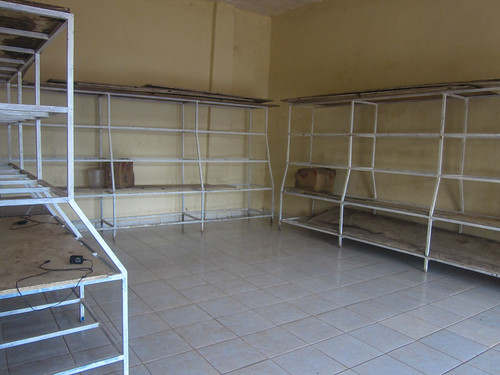

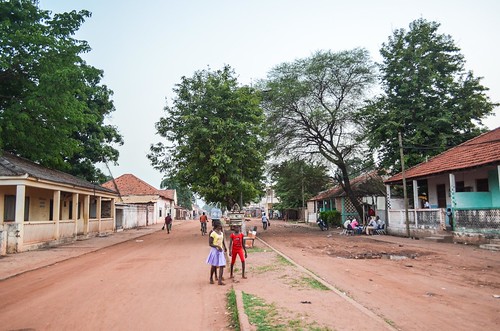
At the last minute of daylight, Domingo from Bissau puts me in touch with his brother Tony and I can stay at his place. After dinner, my eyes start to close automatically. Sadly, those long days cycling in the sun don’t leave me much energy to chat until late. Especially once my stomach has received food.
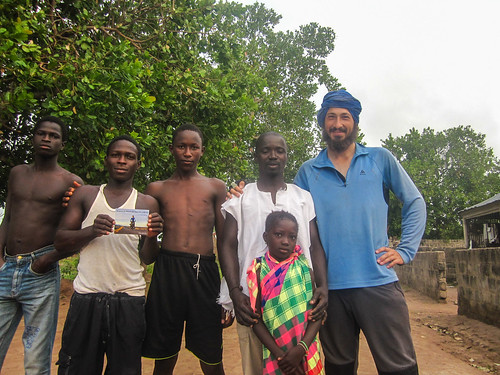
I leave Tony in Gabu after another early morning. My wake-up coffee is not available black with sugar. If I want sugar, “then you must have milk“, says the boutique owner. The sugar is actually only coming from the sweet condensed milk.
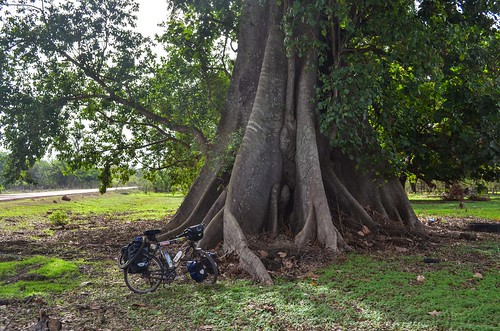
Gabu is the end of the paved road from Bissau. From Gabu to the border with Guinea, the road is sometimes a good piste, sometime an asphalt more potholed than flat, sometimes a bad piste. Cycling within the green lush, on the red piste passing through tiny quiet villages, is very pleasant.
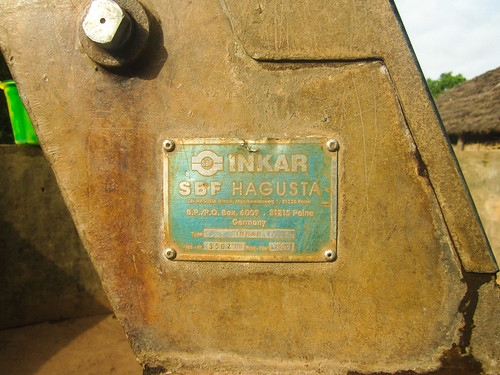
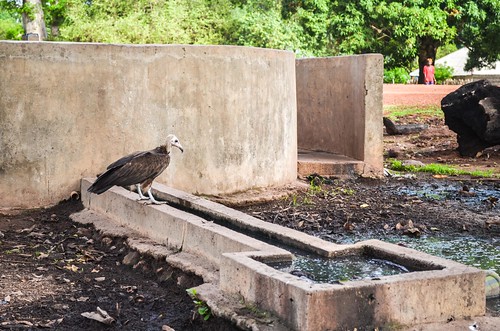
I put my cheche today. I receive less “branco!” or “turista!”, but I cannot melt in the landscape anyway. People on motorbike stop by me to tell me how hard is life in Africa with too much suffering. “En Afrique y’a beaucoup de souffrance, if only I could come to Europe …”.
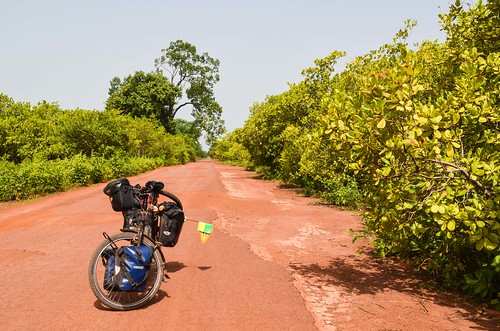

From my point of view, passing at low speed in front of hundreds of houses a day, the most common setup I see is a large family sitting in the shade, playing with the kids, napping or waving at me, at anytime of the day and any day of the week. There is probably a man in the family working hard in the fields or in town so that the rice don’t lack. I don’t see much suffering, rather the opposite. Everyone has a house and I never spotted a kid or an adult as skinny as a model, far away from the ads asking for donations for food projects for example. People are, in the countryside, just not busy. There are so many things to do and develop, yet there are no jobs. What I witness is the lack of means and motivation, the complete absence of hope in the future of their own country, the excessive belief that one day they’ll get to Europe and become rich, and a permanent fatalism, because if anything goes right or wrong (and it mostly goes wrong), it is because Allah/God meant it.
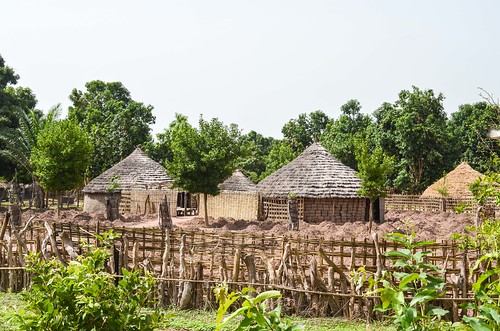
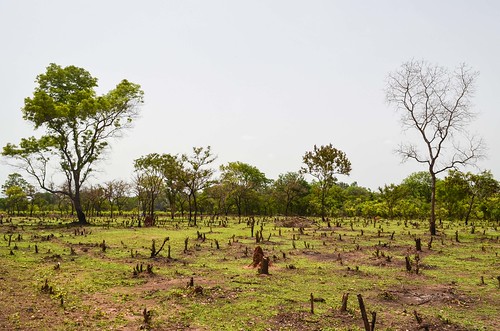

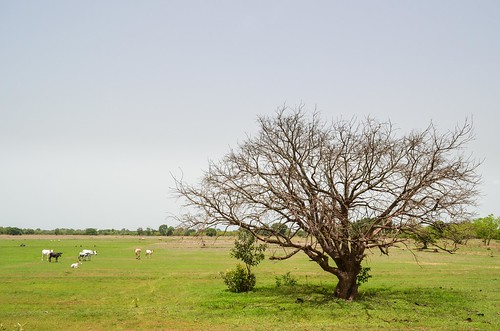

The prices for basic goods go up as I make my way away from Bissau. I am now in Buruntuma, the exit border post. Here also, there is a short “no man’s land” before joining the Guinea border post. It is a very bad road.
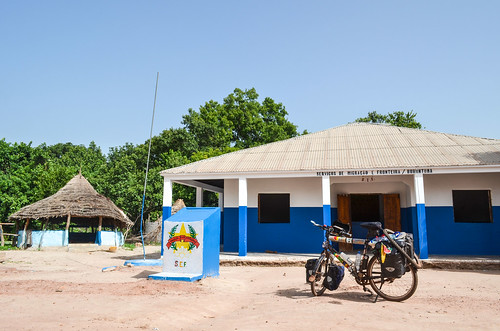
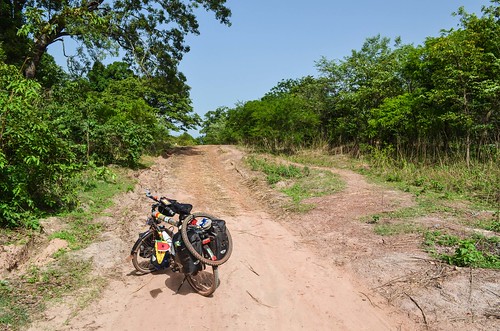
I am welcomed in the middle of the afternoon at the Kandika border post by an angry Guinean customs officer:
“You look like an Arab and I don’t like Arabs“.
I ignore know if Guineans don’t like the French either. I was told several times that the visa procedure that France imposes to West Africans is really mean. Lots of documents required, a 60 € application fee, and a process as dodgy and mysterious as the African ones. Except that it always ends with a refusal, no refund and no explanation. On the other hand, most of West Africans I talked to don’t really accept the rules of the visas. They imagine that gathering the money for the transport to Europe, and possibly the proper documents, will open to them the gates of a paradise, with unlimited stay and easy money.
The mean guy prevents me to take pictures when the other officer was initially fine with it (fortunately I had already taken a shot before they saw me). That one asks me:
“– D’où venez vous ?
– De Bissau.
– Non! D’où venez vous, après ?
– Ah … je vais à Koundara.
– OK.”
The stop at the police office for the immigration procedure is also funny. The officer must fill his book of entries with my details. There is of course no computer or any sophisticated systems like in airports, and it’s much better like this.
“Assoiyez vous. So your name is Jean-Baptiste Pierre …. And all those others too? There’s no space for the rest.”
That’s how he recorded half of my first names and skipped my family name.
“Visa number … This one? “, he asks me, pointing at the Mauritanian visa. I have to make him turn the pages until reaching the visa reading “République de Guinée” and not “Ambassade de Mauritanie – Rabat”. When I think of the long and arduous process to get the right visa, while I could enter the country with an expired Mauritanian visa …
When I show him the correct visa number, he happily says “Ah ok. You see, it’s good to ask, because we never know!“. He then returns my passport.
“- No stamp?, I ask
– No, it’s fine like this. Why, do you want a stamp?
– Hem, … I don’t know, how do you do usually?
– Okay okay …. we’ll put you a stamp. ”
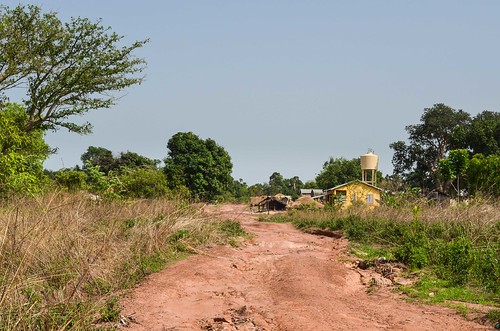
It is not my role to dictate the police what they should do, but I’m always thinking that one officer would skip some parts of the official procedure on purpose so that others at road checkpoints can ask for a bribe. However, this one seemed to have no clue what a passport and a visa are for.

The first kilometers into Guinea are made on a cyclocross-like piste, halfway inside a dry river bed. The first town 14 km after the border post is Sareboïdo.
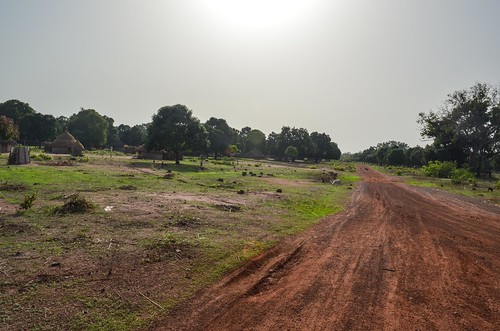
I changed country but there is not much change in the dwelling or activities of the people. The country borders were made by the colonial superpowers without concern for the ethnic groups anyway, so the only differences on both side of a state border would be the differences brought under the colonial rule, like the official language. There is maybe more in common between a Fula in Guinea and a Peulh (=Fula) in Senegal, than between a Fula and a Mandinka both from Guinea.
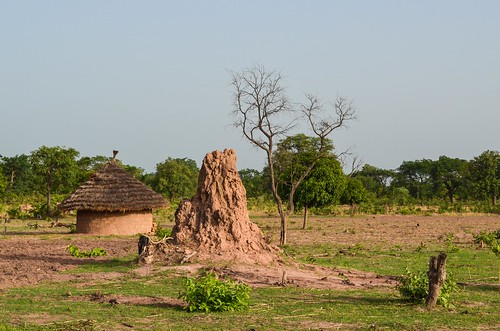
I see more bicycles than cars, and some motorbikes. The kids riding adult bicycles are sitting on the frame, as the saddle is too high. Or, if even the frame is too high, they would cycle with one leg inside the frame bars. The kids shout at me as usual. In Guinea I am, like all the White people, a “Porto”, in reference to the Portuguese. But when I get closer, they don’t ask for a present or money, they just salute me politely with a “Bonsoir monsieur”. This one is a big change for me. Another change is the headscarf on the head of many women. Guinea is much more Muslim than Guinea-Bissau, with Islam making up to 85% of the population.
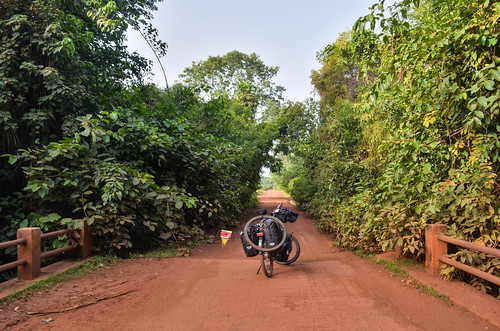
I see also the first (mini-) mountain since ages ago! I have not gone above 100m above sea level since the beginning of the Sahara, three months ago. Guinea will bring back those mountains, and hopefully, the stunning views that I am missing.
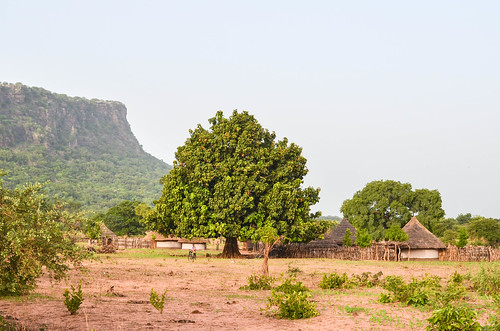
I finally cycled in a day from Gabu to Koundara, 120 km, which is quite a performance considering the bad roads. It was pleasant and quiet, and I had no reasons to stop. Thus I am already in a Guinean city. It doesn’t mean power supply, even if the market streets are lit up at night by brand new solar lamps. There is never power, but for a party sound system, there is always! My hotel is also a bar, so they put on the generator for the lights and the music (but not for the hotel rooms). Generators running on petrol eat a lot of money, so they only run when the electricity generated is bringing enough cash in.
After killing the cockroaches running on my bed, I wait for the moment I stop sweating in order to bucket-shower. But this moment never comes. I am sweating continuously. I feel like during the Indian summer, when one is sweating already right after showering. I am really looking forward to go uphill in the Fouta Djallon and find “normal” temperatures …
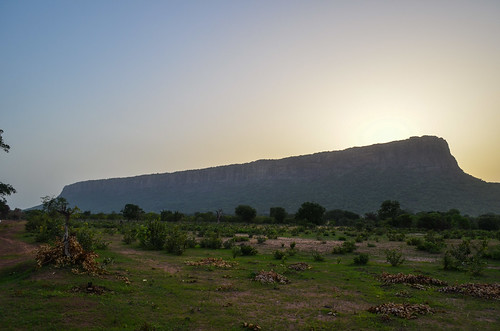






J’aime bien le choix entre le café noir et le café au lait sucré. On dirait les jihanki 🙂
Salut Branco!
Bizarre, tu fais reference a la chanson prakatatumba et quelques jours après tu te fais voler…loi de l’attraction ou signal ….ou…coincidence..
En Europe c la canicule, 38C hier nearby Baden et 41C en Alsace ou g passé qques jours a la ferme. Pfff.
je vois que tu t eclates! keep the groove 😉
Cheers!
Ps: c vrai, tu ressembles a un Bedouin.
au moins t’a la chance d’avoir un bureau avec la clim (ou bien ?) et d’en profiter regulierement … he he
ps: attention avec la SBB!